- Home
- Kirsty Murray
India Dark Page 3
India Dark Read online
Page 3
‘Board and lodging! You talk as if she was a stranger, Adeline, not your own sweet child!’
Mother slumped in a chair and put her head in her hands.
‘More schooling for Poesy won’t put bread on the table,’ she said, ‘but if she takes to the stage she could save Chooky. Look at the boy. Look at him. What’s his future? You worry about the girl, but Chooky will be a man and have no way of supporting himself. You talk as if Poesy will be able to provide for this family on a teacher’s wage. What happens when she marries? But she can help us now. Thirty shillings a month for two years would mean Chooky could stay at school for as long as needs be.’
‘You’d sell your daughter for thirty pieces of silver!’
Mumma turned to me.
‘Poesy,’ she said. ‘What do you want to do?’
I couldn’t look at Yada. ‘I want to join the Lilliputians. I want to go to America.’
America, America, America: the words ran around the inside of my head like music. Whenever I could cadge a penny I’d go down to Mr West’s cinema and watch the American movies, and it seemed as if everything alive and exciting and worth living for was in that country. It’s all I wanted, to feel more alive. I didn’t understand what it meant to be ‘careful what you pray for’.
Early next morning, I took the billycan down to the fence and hung it from a nail by the front gate. The milkman would fill it in the dark early hours and lower it to the ground by its string. The street was quiet. I could smell the damp from the river and the fog rising. I tried to think about the power of thought, about making my future with my thoughts, but my mind felt blank. There wasn’t a single thought I could hold that made me feel I had made the right choice.
I walked slowly up the path, tapping out a rhythm with my feet. In the still dawn, my voice sounded clean and sweet as I sang a little skipping rhyme I’d made for myself about the Lilliputians: ‘Tilly, Flora, Daisy. Ruby, Beryl, Pearl. Lulu, Iris, Valentine, soon these girls will all be mine. Soon they’ll be my friends.’
On Monday, Mr Smith the milkman called with his account. He usually kept sugared almonds in his pocket, but that last Monday he had run out.
‘Next time, Poesy,’ he said.
‘There might not be a next time,’ I said, almost not believing my own words. ‘I’m leaving, Mr Smith. Going away with the Lilliputians. Right around the world!’
It wasn’t until I said it out loud that I felt I understood what it might mean. But in truth, I understood even less than I imagined.
8
REHEARSING THE FUTURE
Poesy Swift
Tilly was always at Balaclava Hall ahead of me but I liked to take my time. I liked to stand at the top of the road and stare at the hazy blue Dandenong Ranges, dreaming about the future. And the other good thing, if I waited, was that I could walk with Charlie Byrne.
Every morning, Lionel and Charlie would step down from the tram at Darebin Road. Lionel was fourteen and one of the eldest Lilliputian boys, though he could pass for much younger, and showed no sign of whiskers or muscles or anything manly. He always pushed past me, he never wanted to talk to any of the new girls. Charlie was a year younger but he was happy to chat with me. In the beginning, I imagined that if he had been a girl he could have been my sister. I don’t think I understood what it meant to have a sister.
We both knew that when we arrived at the hall, we wouldn’t speak to each other again. As soon as the others came in sight, Charlie flapped his arms and ran at the boys. Then Lionel would go to hit him and they would tussle like two puppies. I suppose it kept them warm. It was icy in Thornbury on those winter mornings. I tucked my hands beneath my arms to stop them turning blue and watched the boys wrestle.
Mr Arthur hated it when the boys fought. It was the only time I saw him cross during those Melbourne days. Sometimes he’d send the stage manager, Mr Eddie, or the props master, Mr Jim, into the yard to sort them out. But no one took Mr Jim or Mr Eddie seriously because they looked so young. Mr Jim was only nineteen and Mr Eddie had been a Lilliputian only a few years ago, though now he was twenty-one and married with a baby. When they stepped between the boys, it looked as though they were simply playing along with them.
Mr Arthur hardly ever shouted at us girls. The only time you could tell he was angry was if he dropped his gaze and the cleft in his chin grew deeper as he gritted his teeth. It almost made him look even handsomer. The line of his jaw was so strong and sharp, it was as if a sculptor had carved it and chiselled his high cheekbones and smooth brow. But mostly he was jolly because we all wanted to please him. When he was directing the chorus line every girl sang as sweetly as she could, and when we danced for him it was as if we were floating on air.
In those winter months at Balaclava Hall, I remember Mr Arthur smiling all the time. Even his eyes grew smiley when he was pleased with our singing. When Mrs Essie called him ‘Baby’, as she often did because once he’d been the youngest in the troupe, you could see the boy in him, even though now he was a proper grown-up man.
Perhaps that’s why I found it easy to talk to him. I’d always been shy of talking to men and boys but Mr Arthur was different. So was Charlie Byrne.
The first time Charlie and I spoke, it was an accident. I was sitting in the big gum tree that grew beside the hall. Charlie came pelting outside as if his tail was on fire. He scrambled into the lower branches and was up next to the roofline before the other boys had even made it out the doorway. At first he didn’t notice me sitting with my back against the trunk and my stockinged legs stretched along a branch. I gave a little cough so as not to startle him, but he nearly lost his balance when he saw me.
‘Sorry,’ I said.
‘It’s not the place you expect to find a girl,’ he said.
‘Who are you hiding from?’ I asked.
‘I’m not hiding. Not yet. Anyone can see us from the ground.’
I glanced down through the leaves. ‘What will they do if they spot us?’
‘They won’t. Least they won’t find me.’ Then he stepped into a deep fork in the heart of the old tree. I hadn’t noticed it before. He had to wriggle down to get inside the hollow.
I climbed across from my branch and peered into his hidey-hole. ‘I never thought of that. No one would know you’re there.’
He turned his face upwards. His eyes were like green jewels, the way the sun lit them. He had a tiny pale scar above one eyebrow and a wide, soft mouth. It was like looking down into the face of an elf.
‘Is there room in there for me too?’ I asked.
Even though there wasn’t really any space left he said, ‘Yes. It fits two.’ And then I slid down beside him, trying to hold my skirt in place as my body scraped against his. His face was only inches away. I kept my arms very still, pressed against my side, and we both held our breath and listened. We could hear the sound of footsteps, of the other boys pelting past the gum tree. I heard Freddie and Max Kreutz shouting and I shuddered a little. They were the biggest boys – a pair of tawny-haired twins with big fists like hams and long, meaty cheeks – and Tilly had warned me about them.
‘Why are they chasing you?’ I whispered.
‘I foxed them with a bit of magic, and Kreutzes don’t like being foxed. Freddie Kreutz, he’s the boss of the boys.’
‘Why is he the boss? I thought your brother Lionel was the boss.’
‘Lionel?’ I could feel his breath warm against my cheek as he sighed. ‘Never. The Kreutz twins have been on the stage since they were six. They’ve got two big brothers who were in the Lilliputians and now they’re actors in London and San Francisco. Kreutzes reckon anything they don’t know about theatre isn’t worth tuppence.’
‘Tilly told me those Kreutzes won’t be allowed to go on tour soon,’ I confided, ‘because they’re too interested in the girls. When Freddie caught Tilly all alone behind the hall, he tried to kiss her. And when Max watches you, it makes you want to pull your skirt down to your toes and fold your arms across your c
hest.’
Suddenly, I realised I was pressed up close to Charlie without a whisker of space between us. I sucked my tummy in and tried to make a little gap between him and me but it didn’t work. I could feel his chest moving in and out as his breath quickened and our silence seemed to make the hollow even more snug.
‘You’re not like the other boys,’ I said. ‘They smell funny, like chalk and boy-sweat – sort of dusty and gritty and a little bit sour.’
‘You reckon I smell sour too?’
‘No,’ I said softly. I rested my chin on Charlie’s shoulder so my nose was almost touching his ear. I could feel the heat of him against my face. ‘You smell like matches and liquorice.’
He put his hands on my shoulders and pushed me away, so at last there was a little sliver of space between us. ‘Maybe we should climb out now.’
From outside, we could hear the babble of girls talking as they left the hall and drifted into Darebin Road. ‘Not yet,’ I said. ‘I want to wait a little longer. Just until Tilly has gone home.’
‘You don’t like Tilly? I thought she was your friend.’
‘I do like Tilly. It’s just that sometimes it’s hard being a Lilliputian.’
‘You mean the routines? I can help you with those, if you like.’
‘No, it’s not the dances or the songs that are hard. They’re fun. The hard bit is trying to understand who you’re meant to be friends with.’
Charlie furrowed his brow, as if he wasn’t quite sure of what I meant.
‘You see, everyone likes Tilly,’ I explained. ‘But she doesn’t like everyone so I don’t know who is safe to talk to. I thought I’d be friends with Valentine, but Tilly told me Valentine was her best friend and it wouldn’t do for one of her second-best friends to try and steal her very best one away. Who should I like?’
Charlie didn’t answer. He was listening to the voices outside, as if part of him was somewhere else, thinking about some other problem.
‘They’re gone. Tilly and that lot,’ he said.
‘Help me out then,’ I said. ‘You’ll have to give me a boost.’
He made a stirrup with his hands and when I put my foot in it, he laughed.
‘What?’
‘Your feet. They’re so small. They’re like tiny pinecones.’
I could feel the blush rising up right from the heel of my foot as he boosted me out of the hollow. We sat in the open branches and looked down into the yard. Most of the children had disappeared and only the grown-ups and a few older girls stood on the steps of Balaclava Hall.
‘Who is that one? The beautiful lady?’ I asked, pointing at a girl with long, soft brown hair and skin like white satin touched with the softest pink. She stood beside Mr Arthur and when she laughed at something he’d said, her voice was like a lovely bird song.
Charlie shrugged and his mouth turned down, as if he were disappointed. ‘She’s not a real lady. That’s only Eliza.’
‘She’s very pretty. You have to admit she’s pretty.’
He shrugged again. Perhaps it wasn’t right to ask a boy about other girls. ‘Maybe she’s pretty,’ he said. ‘Maybe she’s dangerous.’
‘Dangerous?’ It was such a peculiar thing to say. I looked down at Eliza again, at the neat turn of her tiny waist, at the way she tipped her head back when she laughed, her long white neck and her sweet, round face.
‘I hope I’m dangerous when I grow up,’ I said.
9
SETTING SAIL FOR LILLIPUT
Tilly Sweetrick
I simply adored that moment when the ship’s steward called, ‘All visitors ashore!’
I’d already said goodbye to Ma long before the call. I think she was glad to see the back of me, but not as glad as I was to be going away from Melbourne. Away from listening to her moan about my father, away from her drunken shouting at the empty seat in the kitchen where he used to sit, away from her weepy apologies the morning after as I made peace with the neighbours and tidied up the horrid mess she had made of our lives. At the beginning of every Lilliputian voyage, I felt as though all the strings were being cut, a kind of giddy weightlessness that meant I was free again.
Poesy was still holding on tight to her family. She clung to her granny, while her little brother kept butting her hip, trying to make a space for himself between them. Her mother had the good sense not to come to see her off. It was dismal having to watch all the mothers weeping on the dock. I slipped an arm through Poesy’s and drew her towards me. She definitely looked like someone who needed rescuing.
‘You write to me. From everywhere,’ whispered the brother, in his strange baby voice. ‘Promise. Postcards, especially.’
‘Yes, darling,’ said her granny, ‘write to us from every port and hold us in your thoughts.’
Poesy nodded, as if it was too hard to speak. I wished they would leave. I knew she’d start to blub if they stayed any longer. Two years might have seemed a long time to them. To me, it was nothing. Only two more years – it made my heart sing. By the time we came home, I would be seventeen and everything would be different. I’d be old enough to put my hair up, old enough to audition for the variety shows, choose my own clothes and find myself a real beau.
I took Poesy below deck to the cabin she was to share with me, Valentine and Eliza. The beds had shiny brass railings with the Currie line emblem on them and the flowery curtains could be drawn right around the mattress. I could see her eyes grow big with the sweetness of it – our girls’ cabin. It was rather nice to be the one to introduce her to her new life. We stood side by side and stared at our reflections in the mirror above the washstand. She was so happy. Whatever she said later, at that moment I knew Poesy was happy. The strings were loosening.
‘My dad sailed the world,’ she said. ‘He brought me back dolls from some places. I have them with me for good luck.’
She took a green-and-silver cloth-covered storybook and two funny, ugly little figurines out of her old tapestry bag. She tucked the book under her pillow and sat the dolls on the edge of the washbasin. They were no longer than my finger and had grubby little clay faces and worn sackcloth dresses. I could see she thought they were lovely, so I had to pretend.
‘They’re darling,’ I said, picking one up between two fingers and trying to look interested. ‘But you don’t still play with dollies, do you?’
Poesy blushed, a slow creeping pink that started at her throat and then turned her face bright red. She snatched the dolly from me and held it as if it was the most precious thing in the world. I didn’t mean to upset her, but she had to realise that we were all getting too old for dolls and toys and storybooks. I hugged her close and stroked her flushed cheeks.
‘This is a whole new life, Poesy. You’re about to sail around the world, like your dad. You’re almost a grown-up, seeing ports and the seven seas and the wide, wide world. You can be free now.’
Poesy rested her head on my shoulder and sighed. For the loveliest moment, we understood each other.
Then Eliza walked in and Poesy changed. Even then, there was something between them, though Poesy swore there wasn’t. It was as if she thought Miss Eliza Finton was someone special.
Eliza lay down on one of the lower bunks, her face to the wall, hardly noticing us.
‘Are you all right?’ asked Poesy.
Eliza lay there rubbing the edge of her shawl against her cheek, like a baby comforting herself. It was a pathetic little show. She couldn’t possibly be sad at leaving Melbourne. She didn’t even have any family there. Maybe she was having a sulk so that Mr Arthur would change the cabin arrangements. She couldn’t have been happy about sharing a room with three younger girls. But it was her own fault. She’d said she didn’t want to share with Ruby and Tempe and Clarissa, and now she was stuck with us.
‘Go and play,’ she said, her voice flat and uninterested.
Poesy stepped closer, as if she wanted to comfort her.
‘Yes, c’mon,’ I said, grabbing Poesy’s hand and pulli
ng her into the corridor. We ran up on deck and stood watching Melbourne disappear from view as the Ceylon steamed across the flat waters of the bay. Suddenly, Poesy let out a little sob.
‘You should be happy. I thought you wanted to come away,’ I said.
‘I did. I do, I still do. But can’t you feel both things? Happy– sad and sad–happy at the same time?’
That was the problem with Poesy. Nothing was simple. She saw the good and the bad in everything.
Suddenly, out of nowhere, Flora Henley and Daisy Watts careered into us, squealing with excitement. I was annoyed but Poesy apologised to them. Apologised – to seven-year-olds! She couldn’t see past their top-of-the-chocolate-box sweetness to put them in their place. I suppose they were pretty enough, Flora with her chocolate curls and bright green eyes and Daisy with her pudding face and plump lips that she liked to nibble when she was thinking. Not that either of those two did much thinking. They spent more time giggling than letting any ideas slip through their airy heads.
‘Haven’t you two got somewhere that you have to be?
Someone else that you have to annoy?’ I said.
‘We’re exploring,’ said Daisy. ‘Do you want to play, Poesy?’
‘No, Poesy doesn’t want to play baby games. Off you go, shoo!’
As the two flighty imps cantered down the deck, I made Poesy turn to look me in the face.
‘We are going to have a great adventure, Poesy Swift. Now we’re away from our mothers and Mrs Essie and all the nay-sayers, we can do what we want.’
‘But we have to work too, don’t we? Mr Arthur said we have to rehearse in the dining hall every day and that matron, Miss Thrupp, she seems very strict.’
‘Pish-posh! Mr Arthur is easy to please and Miss Thrupp is a little mouse. A bit of singing and dancing in the morning and then the rest of the day we can do as we please.’
‘Aren’t we meant to have lessons in the afternoon? Mrs Essie told my grandmother there was a teacher.’
I put my arm around her shoulder. ‘That’s the beauty of being away. They’ve said Myrtle Jones is our teacher but Myrtle is really a Lilliputian. It’s all a blind. Myrtle is only seventeen and she never even finished school.’

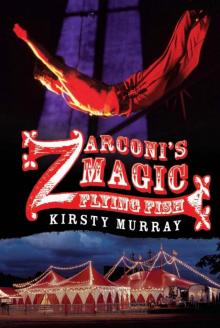 Zarconi’s Magic Flying Fish
Zarconi’s Magic Flying Fish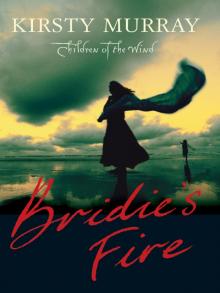 Bridie's Fire
Bridie's Fire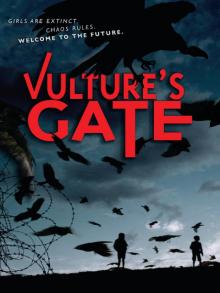 Vulture's Gate
Vulture's Gate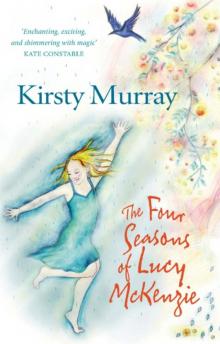 The Four Seasons of Lucy McKenzie
The Four Seasons of Lucy McKenzie A Prayer for Blue Delaney
A Prayer for Blue Delaney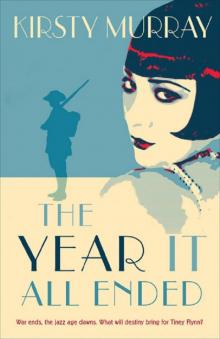 The Year It All Ended
The Year It All Ended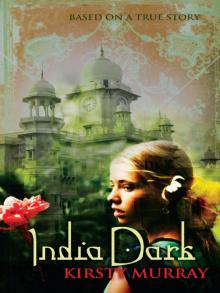 India Dark
India Dark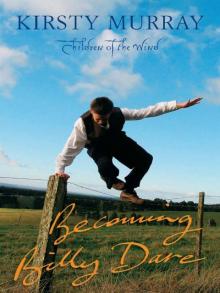 Becoming Billy Dare
Becoming Billy Dare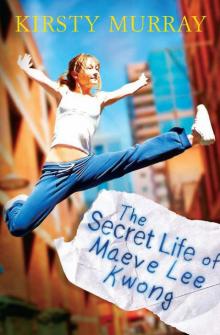 The Secret Life of Maeve Lee Kwong
The Secret Life of Maeve Lee Kwong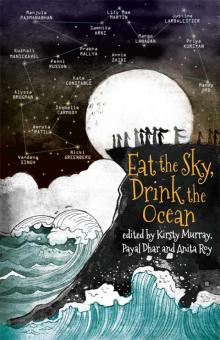 Eat the Sky, Drink the Ocean
Eat the Sky, Drink the Ocean